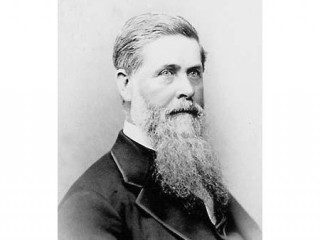
Jay Cooke biography
Date of birth : 1821-08-12
Date of death : 1905-02-16
Birthplace : Sandusky, Ohio, U.S.
Nationality : American
Category : Science and Technology
Last modified : 2011-07-15
Credited as : Financier, ,
Born at Sandusky, Ohio, on Aug. 12, 1821, Jay Cooke was the son of a frontier lawyer and politician. He stopped his schooling at 14 and worked as a clerk in his own community and in St. Louis, Mo. He arrived in Philadelphia in 1839; from that time on his activities were virtually always associated with this city, which he made the leading financial center of the country for a brief time. He learned banking in the firm of E. W. Clarke and Company, where he worked until 1857. In 1861 Cooke set up his own banking house, a partnership, Jay Cooke and Company, engaging in the characteristic activities of private or merchant bankers: dealing in gold; buying and selling the notes of state banks; trading in foreign exchange; and acting as "note" broker, that is, the discounting of commercial paper.
The outbreak of the Civil War gave Cooke his great opportunity, and his many fruitful ideas pushed him to the top of the business. Salmon Chase, the secretary of the Treasury and a fellow Ohioan, sought to sell the Treasury's first issues of war bonds and notes through banks and failed (at this time it was customary to dispose of public securities by competitive bidding). Cooke persuaded Chase to appoint him a special "fiscal agent." Using the then unheard-of methods of advertising and personal solicitation by salesmen all over the country, Cooke sold at par (from October 1862 to January 1864) more than $500 million of the 6 percent bonds to as many as 1 million individual investors and country bankers. As fiscal agent, Cooke played another important role: he supported the price of government securities in the New York money market. "Pegging the market" from this time on became a necessary part of such financing. In January 1865 Cooke was called again to handle a large issue of 3-year Treasury notes bearing 7.3 percent interest; in 6 months he sold more than $600 million.
By the end of the war Cooke had three banking houses, each with a separate group of partners, in Philadelphia, New York, and Washington. In 1870 a similar bank was set up in London, and the next year all were brought together as a single partnership. Cooke expanded (and overexpanded) into many fields. He had been friendly to the National Banking Act of 1863 and obtained charters for national banks in Washington and New York; the national banks were the prime source of Cooke's strength.
To these banks and to small investors at home and abroad Cooke, now an investment banker, sold participation in state and railroad loans; the largest loans went to the great land-grant Northern Pacific Railroad, which was chartered to run from Duluth, Minn., to Tacoma, Wash. In this connection Cooke introduced two new ideas into banking: the establishment of banking syndicates as underwriters to handle particular issues, and the active participation by bankers in the affairs of the companies they were helping finance. Thus, Cooke became the banker and fiscal agent of the Northern Pacific in 1869, and he made short-term loans to the railroad out of his own house's resources—a fatal step.
In 1870, although Cooke was responsible for the proposal, he was only one (and a lesser participant) of the investment banking houses taking part in the great refunding operations of the Civil War loans. Congress authorized the sale of $1.5 billion worth of Treasury securities of various types bearing 4 to 5 percent interest in exchange for the higher-priced wartime issues. J. S. Morgan and Company, and Drexel, Morgan and Company, and their English connections now had their opportunity, and they pushed Cooke into the background.
Meanwhile, Cooke's troubles with the Northern Pacific Railroad were piling up. In addition to making loans to the railroad, he undertook the underwriting of its initial issue of first-mortgage bonds. But sale of these bonds moved slowly, and the firm of Jay Cooke and Company continued to make advances to the railroad out of the demand liabilities of its customers; this was a risky business. All the western rails required large funds for building and improvements, and when the national economy turned downward in early 1873, investment markets dried up. Cooke's banks and his associated houses were caught in illiquid form—they could not meet the demands of their depositors—with the result that on Sept. 18, 1873, the New York office of Jay Cooke and Company shut its doors, as did the banks with which it was associated.
This started the large-scale Panic of 1873; one of its results was the complete collapse of the Cooke financial empire and the end of Cooke's influence in the money markets; his personal fortune was wiped out. Later in the 1870s he invested a small sum in a silver mine which turned out to be a bonanza, and Cooke was able to sell his holdings for $1,000,000, thus assuring a comfortable old age. He died on Feb. 16, 1905, in Philadelphia.
















